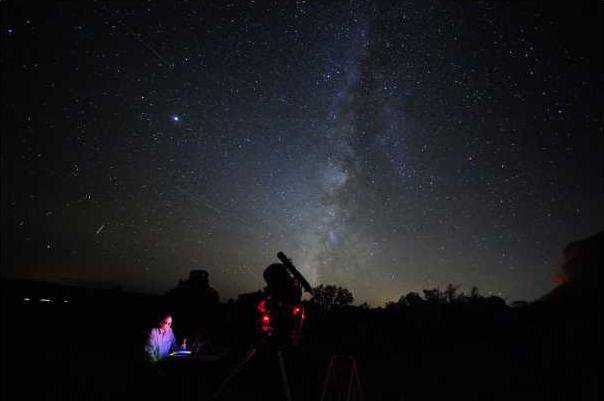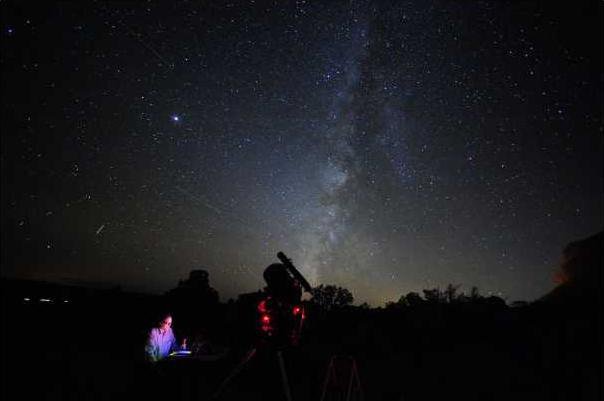For well over half my life and at age 71, that's a tall pile of years I have loved a poem by Walt Whitman, "When I heard the Learn'd Astronomer."
When I heard the learn'd astronomer;
When the proofs, the figures, were ranged in columns before me;
When I was shown the charts and diagrams, to add, divide, and measure them;
When I, sitting, heard the astronomer, where he lectured with much applause in the lecture-room,
How soon, unaccountable, I became tired and sick;
Till rising and gliding out, I wander'd off by myself,
In the mystical moist night-air, and from time to time,
Look'd up in perfect silence at the stars.
The feelings that Whitman so powerfully and simply passes along are the unadorned awe that fills us when considering the night sky, and how unimportant facts and figures seem when confronting those depths. Although it's an unscientific attitude, it really is a legitimate sense of mystification, verging on religious epiphany. I've felt it often enough myself.
Frequently when I set my telescope to the task of recording photons streaming in from some galaxy many millions of light-years away, I've hiked by myself in the dark. The moon is below the horizon at those times because no-moon-is-a-good-moon for an astrophotographer; yet the light of the stars is enough to show the way.
Occasionally, when the route is rough or confusing, I turn on a flashlight the light covered by a red filter to protect my night vision. But most of the time I troop along without artificial light. There, ahead of me, is the gigantic sweep of the southern Milky Way, with the Teapot Asterism and thousands of pinpoint stars, sometimes the false comet star pattern (it fooled me once).
Looking up with my head back, I see the immensity of the darkness and the tiny distant stars. My feelings have no connection to numbers and figures. They are an overwhelming, visceral sense of how little we are, how little we know, how grand and mysterious the universe is.
We know a number of facts like the speed of light, the approximate distance to stars, the size of a galaxy and the number of its stars, even the likelihood of the habitability of particular exoplanets. But I don't believe our science can ever get at the ultimate conundrums. In the title of a favorite painting of mine, Paul Gauguin succinctly expresses fundamental mysteries: "Where do we come from? What are we? Where are we going?"
To begin with Gauguin's first question, we can't answer the riddle through science. The Big Bang Theory holds that everything suddenly erupted out of nothingness, but that's no explanation; how that came about cosmologists really can't say. One controversial explanation, related to string theory, is that the Big Bang happened when hyper-dimensional membranes (called "branes" by theorists) collided. Even if that is true, it gets us no closer to an answer because it doesn't explain the origin of the structure existing at the time of the crash.
Whitman's rejection of the facts and figures of science has a pinch of validity in that much of what people believed about astronomy through previous centuries was known to be false by the time he wrote the poem in 1865. It was thought that comets marked the deaths of the great, stars were light shining through a vast rotating sphere that enclosed the Earth, the position of planets at the time of one's birth determined one's fate ... and on and on.
Yet astronomers had fine instruments and had assembled many provable facts by then. For a single example, take the spectroscopy, a major tool used by scientists to measure everything from the rotation of galaxies to the expansion of the universe to the makeup of stars. Anders Jonas Angstrom began the study of spectra in 1853, and by 1862 he had used the spectroscope to discover hydrogen in the sun's atmosphere. That information was available the same year in "Researches On the Solar Spectrum and the Spectra of the Chemical Elements," by G. Kirchhoff, published in London.
In 1865, astronomy lacked a plethora of information we take for granted. While stars, planets and star clusters have been recognized since antiquity, nobody understood that billions of stars are clumped together as galaxies; galaxies that were observed through telescopes were believed to be nebulous masses in our universe, which was limited to what we know today as the Milky Way Galaxy. Gravitational waves, relativity, pulsars, X-ray astronomy, exoplanets, the mechanisms of star formation and death, radio astronomy, Doppler shifts these were far in the future. But the scientific study of the universe had begun, and since then researchers have steadily filled in some gaps.
My personal hunch is that scientific knowledge may unfold throughout humanity's future with surprising discoveries leading to new questions and newer discoveries without end. But I doubt science can answer that most basic question, "Where do we come from?"
In this, Whitman was right to just gaze up at the stars, silently and filled with awe.
When I heard the learn'd astronomer;
When the proofs, the figures, were ranged in columns before me;
When I was shown the charts and diagrams, to add, divide, and measure them;
When I, sitting, heard the astronomer, where he lectured with much applause in the lecture-room,
How soon, unaccountable, I became tired and sick;
Till rising and gliding out, I wander'd off by myself,
In the mystical moist night-air, and from time to time,
Look'd up in perfect silence at the stars.
The feelings that Whitman so powerfully and simply passes along are the unadorned awe that fills us when considering the night sky, and how unimportant facts and figures seem when confronting those depths. Although it's an unscientific attitude, it really is a legitimate sense of mystification, verging on religious epiphany. I've felt it often enough myself.
Frequently when I set my telescope to the task of recording photons streaming in from some galaxy many millions of light-years away, I've hiked by myself in the dark. The moon is below the horizon at those times because no-moon-is-a-good-moon for an astrophotographer; yet the light of the stars is enough to show the way.
Occasionally, when the route is rough or confusing, I turn on a flashlight the light covered by a red filter to protect my night vision. But most of the time I troop along without artificial light. There, ahead of me, is the gigantic sweep of the southern Milky Way, with the Teapot Asterism and thousands of pinpoint stars, sometimes the false comet star pattern (it fooled me once).
Looking up with my head back, I see the immensity of the darkness and the tiny distant stars. My feelings have no connection to numbers and figures. They are an overwhelming, visceral sense of how little we are, how little we know, how grand and mysterious the universe is.
We know a number of facts like the speed of light, the approximate distance to stars, the size of a galaxy and the number of its stars, even the likelihood of the habitability of particular exoplanets. But I don't believe our science can ever get at the ultimate conundrums. In the title of a favorite painting of mine, Paul Gauguin succinctly expresses fundamental mysteries: "Where do we come from? What are we? Where are we going?"
To begin with Gauguin's first question, we can't answer the riddle through science. The Big Bang Theory holds that everything suddenly erupted out of nothingness, but that's no explanation; how that came about cosmologists really can't say. One controversial explanation, related to string theory, is that the Big Bang happened when hyper-dimensional membranes (called "branes" by theorists) collided. Even if that is true, it gets us no closer to an answer because it doesn't explain the origin of the structure existing at the time of the crash.
Whitman's rejection of the facts and figures of science has a pinch of validity in that much of what people believed about astronomy through previous centuries was known to be false by the time he wrote the poem in 1865. It was thought that comets marked the deaths of the great, stars were light shining through a vast rotating sphere that enclosed the Earth, the position of planets at the time of one's birth determined one's fate ... and on and on.
Yet astronomers had fine instruments and had assembled many provable facts by then. For a single example, take the spectroscopy, a major tool used by scientists to measure everything from the rotation of galaxies to the expansion of the universe to the makeup of stars. Anders Jonas Angstrom began the study of spectra in 1853, and by 1862 he had used the spectroscope to discover hydrogen in the sun's atmosphere. That information was available the same year in "Researches On the Solar Spectrum and the Spectra of the Chemical Elements," by G. Kirchhoff, published in London.
In 1865, astronomy lacked a plethora of information we take for granted. While stars, planets and star clusters have been recognized since antiquity, nobody understood that billions of stars are clumped together as galaxies; galaxies that were observed through telescopes were believed to be nebulous masses in our universe, which was limited to what we know today as the Milky Way Galaxy. Gravitational waves, relativity, pulsars, X-ray astronomy, exoplanets, the mechanisms of star formation and death, radio astronomy, Doppler shifts these were far in the future. But the scientific study of the universe had begun, and since then researchers have steadily filled in some gaps.
My personal hunch is that scientific knowledge may unfold throughout humanity's future with surprising discoveries leading to new questions and newer discoveries without end. But I doubt science can answer that most basic question, "Where do we come from?"
In this, Whitman was right to just gaze up at the stars, silently and filled with awe.








